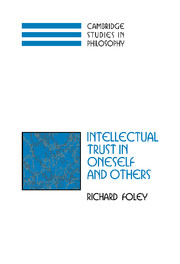4 - Self-Trust and the Authority of Others
Published online by Cambridge University Press: 30 July 2009
Summary
EPISTEMIC EGOTISM AND EPISTEMIC EGOISM
When you tell me that something is the case, there are two kinds of questions for me to face. First, there are questions about your sincerity. Do you really believe what you are telling me, or are you trying to mislead me, and how can I tell the difference? Second, there are questions that presuppose that I can reliably determine whether or not you actually believe what you are telling me and that then go on to ask how, if at all, your opinion should affect my opinion.
Questions of the first sort are concerned with the sincerity or character of those providing the testimony rather than their reliability as inquirers. Politicians, salespersons, and lovers sometimes deny what they know to be true or assert what they know to be false, and virtually everyone stretches the truth from time to time. Given the extent to which we rely on others for information, it is important that we be able to determine reliably whether or not someone is sincerely trying to convey information.
Nevertheless, I will be principally concerned with questions of the second sort, which strip worries about sincerity from the problem of testimony and thereby focus attention on the intellectual authority of other people. Questions about the intellectual authority of others are, in turn, entangled with questions of self-trust.
- Type
- Chapter
- Information
- Intellectual Trust in Oneself and Others , pp. 83 - 130Publisher: Cambridge University PressPrint publication year: 2001
- 1
- Cited by



